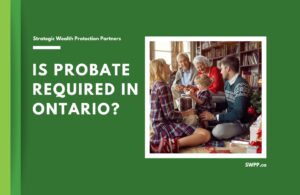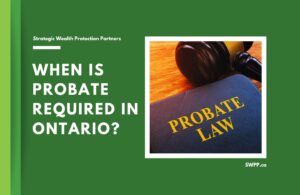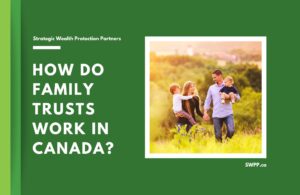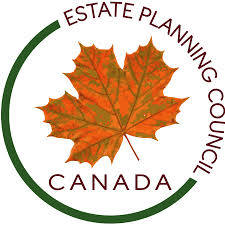Written by Ron Cooke, President & Founder of Strategic Wealth Protection Partners in Ontario, CEA®, Member of the Estate Planning Council Canada
How does the final tax return after death work?
The final tax return, also known as the Terminal Return, is the last income tax return filed for a deceased person.
It includes all income earned from January 1 of the year of death up to the date of passing. This return determines any final tax liability before the estate is distributed. The Canada Revenue Agency (CRA) treats the deceased as if they sold all their assets at fair market value on the date of death, which can trigger capital gains tax.
Filing this return correctly is essential to ensure compliance and prevent unnecessary tax burdens for beneficiaries. Also, beware that while there is no inheritance tax in Canada, your final tax return may represent a large tax hit to your estate.
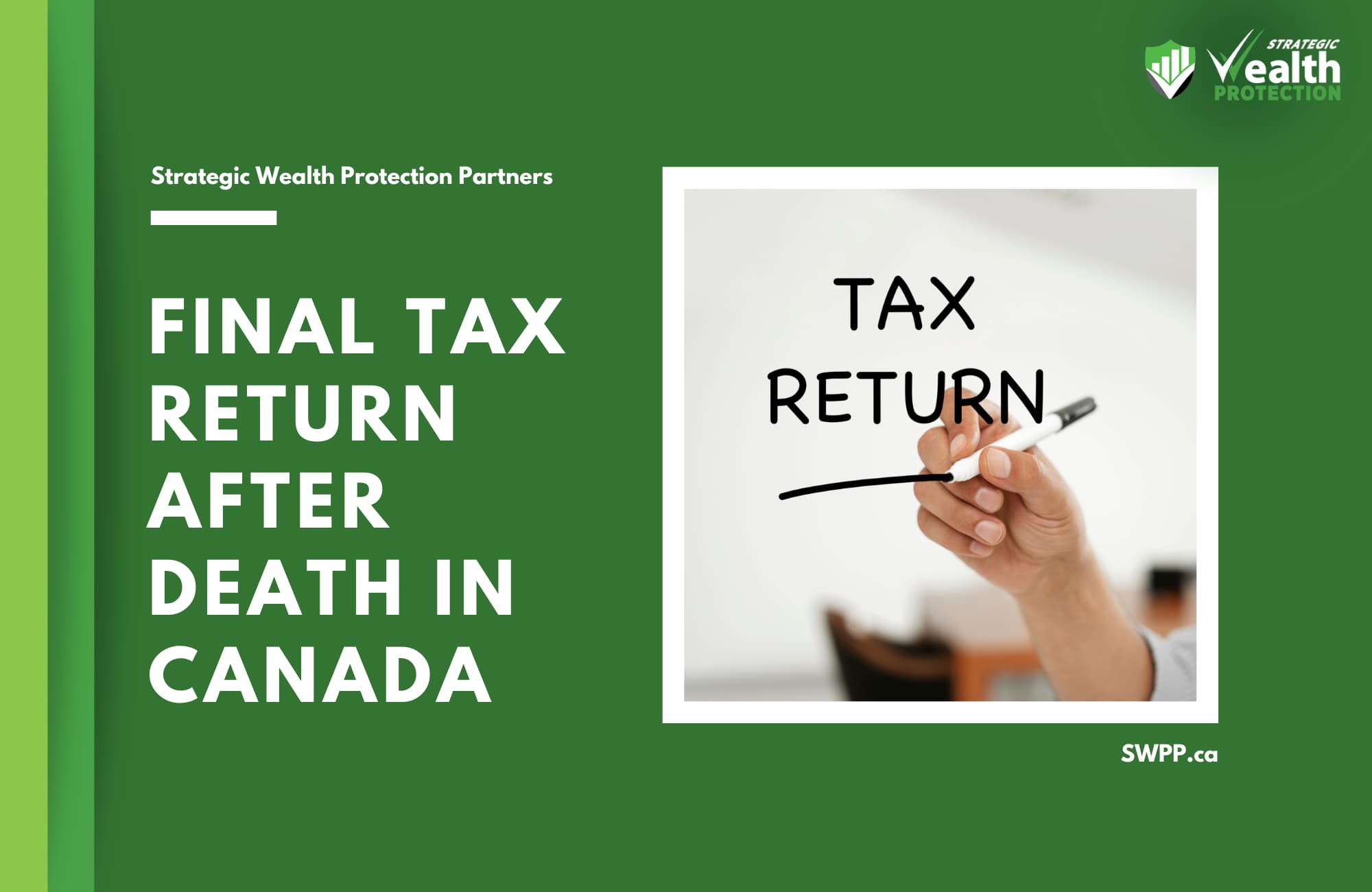
Who pays the final tax return after death?
The executor or estate trustee is responsible for filing the final tax return and paying any outstanding taxes from the estate’s assets.
If there is no executor, a legal representative or family member may take on this role. Taxes must be paid before distributing assets to beneficiaries, ensuring the estate remains compliant with CRA regulations. If the estate lacks sufficient funds, certain assets may need to be liquidated to cover the tax liability.
How can you minimize the final tax return after death?
There are strategic ways to reduce the tax burden on an estate.
One of the most effective methods is utilizing spousal rollovers, where assets transfer tax-free to a surviving spouse. Another option is charitable giving, which provides tax credits to offset income taxes.
Proper estate planning, such as setting up trusts or spreading withdrawals from RRSPs and RRIFs over time, can also help minimize taxation. Working with an estate planner can ensure that tax-saving strategies are properly implemented.

Can life insurance be used to pay the taxes on your final tax return?
Yes, life insurance is one of the best tools for covering final tax liabilities without impacting the estate’s assets.
When structured correctly, the death benefit is paid out tax-free to named beneficiaries or the estate, ensuring there are funds available to pay outstanding taxes. This prevents the forced sale of assets such as family cottages, investments, or business holdings.
A well-planned life insurance strategy can protect your legacy and keep your wealth intact for future generations.
What is the biggest tax hit most estates face?
For many estates, the largest tax burden comes from capital gains tax on appreciated assets and taxation of RRSPs/RRIFs.
Upon death, RRSPs and RRIFs are considered fully cashed out, meaning the entire balance is taxed as income unless transferred to a surviving spouse or dependent child.
Real estate, stocks, and other investments may also trigger significant capital gains tax if they have appreciated over time. Without proper planning, these taxes can take a large portion of an estate.
What are the best ways you can use to minimize estate taxes in Canada?
There are several effective strategies to minimize estate taxes, including:
- Transferring assets to a spouse – Spousal rollovers allow deferral of taxes until the spouse’s passing.
- Using joint ownership with rights of survivorship – This ensures assets pass directly to the co-owner without probate.
- Setting up a trust – A trust can help reduce taxes and control how assets are distributed.
- Charitable donations – Gifting to charity in your will can reduce the final tax bill.
- Using permanent life insurance – A tax-free payout can cover estate taxes, ensuring beneficiaries receive their full inheritance.
Strategic estate planning ensures your loved ones receive more of your hard-earned wealth rather than losing it to taxes.
What is the death benefit in Canada?
The Canada Pension Plan (CPP) Death Benefit is a one-time, taxable payment of up to $2,500 to the estate of a deceased contributor.
This benefit helps cover funeral costs and other final expenses. If no estate exists, the payment may be made to an eligible individual, such as a spouse or next of kin.
While helpful, this amount is often not enough to cover all final costs, which is why additional planning, such as life insurance and savings, is crucial.
Discover How to Minimize Taxes and Secure Your Legacy
Did you know that without a solid estate plan, taxes and fees in Ontario could claim a significant portion of your wealth?
If you’ve worked hard to build your business, investments, and properties, protecting your legacy for your loved ones is critical. At Strategic Wealth Protection Partners, we specialize in helping high-net-worth individuals in Ontario secure their financial futures.
Our Living Estate Plan is designed to:
- Reduce estate taxes and probate fees.
- Simplify wealth transfer to your loved ones.
- Reflect your values and priorities in every detail.
Your Legacy Matters
With our personalized guidance, we’ll help you navigate options like Living Trusts to protect your assets and ensure your family’s peace of mind. Contact us today to book your Living Estate Plan Consultation and take the first step toward a secure future.
Schedule a Living Estate Plan Consultation
Planning your legacy is about more than numbers—it’s about ensuring your family remembers you and your values are honoured for many years to come.
Estate planning and trusts can feel overwhelming, especially if it’s your first time. That’s why we’re here.
With our simple, 5-Step Living Estate Plan, we make the process easy, helping you create a comprehensive estate plan or trust that protects your assets from taxes and probate fees while preserving your legacy. Tools like The Final Word Journal capture your story, wishes, and essential details like accounts and end-of-life plans, ensuring your family has clarity and comfort.
Take the first step today—schedule a consultation call and give your family the ultimate gift: peace of mind and the assurance they were always your priority.
Read More
If you’re starting your estate planning process, you may find these articles helpful:
- How to Avoid Estate Tax in Canada
- How to Avoid Inheritance Tax in Canada
- How to Avoid Inheritance Tax on a House in Canada
About the Author
RON COOKE, PRESIDENT & FOUNDER OF STRATEGIC WEALTH PROTECTION PARTNERS

With over 30 years in financial services, I’ve seen the challenges families face when a loved one passes—lost assets, unnecessary taxes, and emotional stress. That’s why I created the Living Estate Plan, a comprehensive process to protect assets, eliminate estate and probate fees, and create legacies that are remembered for many years to come.
This plan ensures your family receives not just your wealth, but a meaningful reminder of your care and love. Tools like The Final Word Journal capture your story, wishes, and essential details, offering clarity and comfort during difficult times.
Your final gift should be more than money—it should be peace of mind, cherished memories, and an organized estate.
Schedule a Call
Schedule a 30-minute consultation call with Strategic Wealth Protection Partners.
Click HERE to schedule a consultation.


